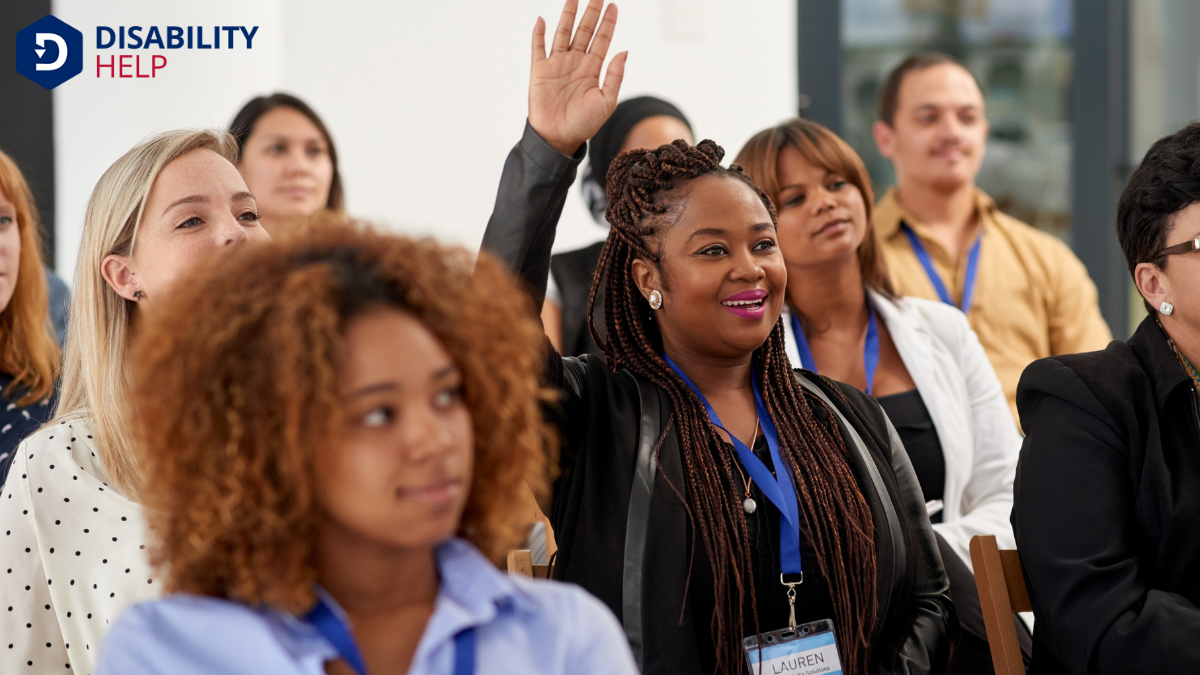Maneuvering higher education with a disability involves understanding our rights and researching accessible schools. We should contact disability services early and communicate our needs to the faculty. Financial aid opportunities, including disability-specific scholarships, can help fund our education. Building a support network and participating in extracurriculars enriches our experience. With the right resources and planning, we can succeed. There's much more to explore about making education accessible and achieving our goals.
Key Takeaways
- Research colleges with strong accessibilityThe design of products, devices, services, or environments to be usable by people with disabilities.... and inclusivity commitments for people with disabilities.
- Understand your legal rights under ADA, Section 504A provision of the Rehabilitation Act of 1973 that prohibits discrimination based on disability in p..., and IDEA for educational access.
- Explore financial aid and scholarships specifically for students with disabilities.
- Utilize campus disability services for accommodationsModifications or adjustments in healthcare settings to support patients with disabilities. like assistive technology and note-taking.
- Build a support network and engage in extracurricular activities for a comprehensive college experience.
Researching Accessible Colleges and Universities
When we begin our quest to find accessible colleges and universities, it's essential to prioritize thorough research. We should start by identifying institutions known for their commitment to accessibility and inclusivity.
Websites, brochures, and campus visits can provide insights into physical accessibility, such as ramps and elevators, and available support services like tutoring or note-taking assistance.
It's also important to reach out directly to disability services offices. Engaging in conversations with staff can reveal how they accommodate specific needs and foster an inclusive environment.
We should ask about technology aids, adaptive softwareSoftware designed to accommodate the needs of individuals with disabilities, often including accessi..., and the availability of sign language interpreters or captioning services. By gathering this information, we empower ourselves to make informed decisions about which institutions best align with our educational goals and accessibility needs.
Understanding Your Legal Rights and Protections

As we pursue higher education, it's essential to understand our legal rights and the protections in place for students with disabilities.
Knowing the disability rightsThe legal and human rights afforded to individuals with disabilities, often the focus of advocacy an... legislation allows us to advocate for necessary accommodations and services effectively.
Let's explore how to navigate institutional policies to guarantee we receive the support we deserve.
Disability Rights Legislation
Steering higher education with a disability requires a solid understanding of disability rights legislation, which serves as our legal shield and guide. Knowing our rights guarantees that we can navigate the academic landscape with confidence.
Here are three key pieces of legislation every student with a disability should be aware of:
- Americans with Disabilities Act (ADA)A U.S. law that prohibits discrimination against individuals with disabilities in all areas of publi...: This law prohibits discrimination and guarantees equal opportunities in education, employment, and more.
- Section 504 of the RehabilitationThe process of helping individuals with disabilities achieve and maintain their optimal physical, se... Act: It guarantees that no qualified individualA person who meets the necessary skills, experience, and other job-related requirements and can perf... with a disability is excluded from participating in any program receiving federal financial assistance.
- Individuals with Disabilities Education Act (IDEA): Primarily for K-12, it lays the foundation for further education rights.
Accommodations and Services Available
Maneuvering higher education with a disability involves understanding the accommodations and services available to us. Knowing our rights under laws like the ADA and Section 504 is essential. These laws guarantee we've access to necessary accommodations, such as extended time on exams, note-taking assistance, or adaptive technology. We can request these through our school's disability services office, which often requires documentation of our disability.
Moreover, many institutions offer counselingProfessional guidance to help individuals cope with emotional, mental, or social challenges, particu..., tutoring, and accessible housing options tailored to our needs. It's important that we advocate for ourselves and communicate openly with faculty about our requirements.
Navigating Institutional Policies
While traversing the complex landscape of institutional policies, it’s crucial to understand our legal rights and protections as students with disabilities. Knowing these rights empowers us to advocate for the support we need to succeed.
Here are three key areas to focus on:
- Familiarize with Laws: Understand the Americans with Disabilities Act (ADA) and Section 504 of the Rehabilitation Act. These laws guarantee equal accessThe principle that all individuals, including those with disabilities, should have equal opportunity... to education.
- Request Accommodations: We should formally request necessary accommodations through our institution's disability services office to guarantee our needs are met.
- Know the Appeals Process: If accommodations are denied, familiarize yourself with the appeals process. This knowledge helps us challenge decisions that don't align with our rights.
Exploring Financial Aid and Scholarship Opportunities
For many of us pursuing higher education with a disability, understanding the array of financial aid and scholarship opportunities is essential.
We should start by researching federal financial aid options like FAFSA, which can open doors to grants and loans. Let's not forget about state-specific aid programs that might cater to our unique needs.
Additionally, there are scholarships specifically for students with disabilities, offered by organizations like the National Federation of the Blind or the American Association on Health and Disability.
We can also explore scholarships based on our field of study or personal background. It's important to carefully read eligibility criteria and deadlines to stay on track.
Utilizing Campus Disability Services
Let's make the most of campus disability services by understanding accessible academic accommodations and how they support our learning.
We should familiarize ourselves with available resources and learn to communicate our needs effectively with staff and faculty.
Accessible Academic Accommodations
Steering through higher education with a disability can be challenging, but campus disability services are invaluable resources that help make academic success achievable.
By utilizing their support, we can guarantee our educational needs are met. Accessible academic accommodations are essential, and knowing what's available is key.
Here’s how we can make the most of these services:
- Request Documentation: Start by providing the necessary documentation that outlines our specific needs. This helps in tailoring the accommodations to suit us.
- Communicate with Instructors: Inform our professors about the accommodations we require. Open communication fosters understanding and cooperation.
- Utilize Available Resources: Take advantage of any assistive technology, note-taking services, or extended time for exams as needed.
Navigating Campus Resources
How can we effectively tap into the wealth of resources available on campus? First, we should connect with the campus disability services office. They’re our allies in maneuvering the academic landscape. By registering with them, we can access tailored support, such as note-taking assistance, extended test times, or adaptive technology.
Let’s not hesitate to ask questions; they’re there to help us succeed.
Next, we should familiarize ourselves with available workshops and support groups. These resources can offer practical strategies and a sense of community.
It's also beneficial to explore additional services, like tutoring or career counselingProfessional guidance provided to individuals with disabilities to help them explore career options ..., which might complement our academic journey. By actively engaging with these resources, we empower ourselves to thrive in our educational pursuits.
Communicating Needs Effectively
When it comes to guaranteeing our needs are met, clear communication with the campus disability services is key. We need to articulate our requirements effectively to receive the support that empowers our academic journey. Here’s how we can make this process smoother:
- Identify Needs: Start by listing specific accommodations that enhance our learning experience. Whether it’s assistive technology or extended exam time, clarity is essential.
- Initiate Contact: Approach the disability services office early. By establishing a rapport, we guarantee they understand our unique situation and can provide timely assistance.
- Maintain Communication: Keep the dialogue open throughout the semester. Regular updates about what’s working or if adjustments are necessary help maintain effective support.
Communicating Your Needs to Faculty and Staff

Although maneuvering higher education with a disability can be challenging, effectively communicating your needs to faculty and staff is essential to your success.
Let’s start by establishing open and honest communication channels. Sharing our needs early in the semester helps faculty understand and accommodate us better. We should schedule meetings to discuss our specific requirements and be prepared to provide documentation if necessary.
It’s important to approach these discussions with clarity and confidence, ensuring we express ourselves clearly. By doing this, we foster a collaborative environment where faculty can offer their support.
Let’s remember that most educators are keen to help, but they need our input to do so effectively. Our proactive communication can bridge gaps and pave the way for a successful academic journey.
Leveraging Assistive Technology and Tools
Embracing assistive technology and tools can greatly enhance our educational experience and help us overcome various barriers.
With the right resources, we can't only keep up with our peers but also thrive in our academic pursuits. Here are some essential tools to contemplate:
- Screen Readers: These applications convert text to speech, allowing us to easily access digital content, whether it's online articles or e-books.
- Speech-to-Text Software: This tool helps us transcribe spoken words into written text, making note-taking and essay writing more accessible and efficient.
- Adaptive Keyboards and Mice: These devices cater to our specific physical needs, ensuring that we can navigate our computers comfortably and effectively.
Building a Supportive Network
A strong support network is essential for steering through higher education with a disability. We can start by reaching out to family, friends, and mentors who understand our challenges and aspirations.
Let’s connect with campus disability services, which can provide guidance and resources tailored to our needs. By engaging with professors and academic advisors, we make certain they’re aware of our circumstances and can offer accommodations.
It’s helpful to join student groups that focus on disability awareness or support, as they offer camaraderie and shared experiences. Online communities can also be invaluable, offering advice and emotional support from others who’ve faced similar journeys.
Participating in Extracurricular Activities and Organizations

Why should we limit ourselves from exploring extracurricular activities and joining organizations while pursuing higher education with a disability? Engaging in these activities enriches our college experience and fosters personal growth.
Let's consider how:
- Skill Development: Participating allows us to hone skills beyond academics, such as leadership, teamwork, and communication, which are essential in any career.
- Social Connections: Joining organizations helps us build friendships and a sense of community, reducing isolation and enhancing our support network.
- Mental Well-being: Involvement in extracurriculars provides a creative outlet and stress relief, contributing positively to our mental health.
Planning for a Smooth Transition to College Life
As we prepare to commence our college journey, planning for a smooth change is essential to success and well-being. First, we should familiarize ourselves with the campus layout and accessibility features. This includes knowing the locations of ramps, elevators, and accessible restrooms.
Meeting with the disability services office early can help us secure necessary accommodations and resources. We should also consider reaching out to future classmates or joining social media groups to build a supportive network before arriving.
Time management is vital; let’s create a schedule that balances academic and personal needs.
Don’t forget to familiarize ourselves with available mental health resources on campus. By taking these steps, we’ll ease our change, ensuring a more enjoyable and successful college experience.
Conclusion
In our journey to pursue higher education as individuals with disabilities, let's remember that we're not alone. By researching accessible institutions, understanding our rights, and seeking financial aid, we can set a solid foundation. Utilizing campus services and assistive technology empowers us to succeed academically. Communicating our needs and building a supportive network guarantees we're heard and valued. Let's embrace opportunities in extracurriculars and plan for a smooth changeover, knowing we're capable of thriving in college life.






